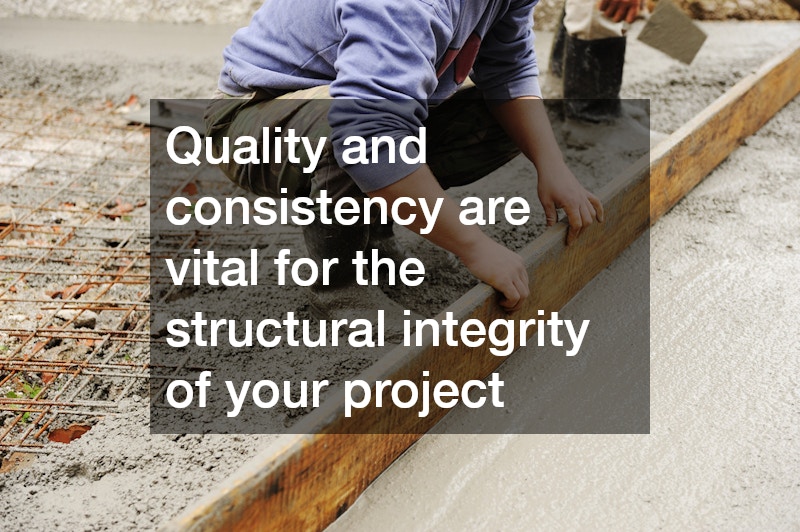Choosing the right concrete supplier is crucial for the success of any construction project. Knowing the right questions to ask can help you make an informed decision. This article explores the top questions you should discuss with your local concrete supplier to ensure quality and reliability.
1. What Types of Concrete Mixes Do You Offer?
Each construction project requires a specific type of concrete mix. Asking your supplier about the types of mixes they offer will provide insight into how they can meet your project’s unique requirements and help you achieve the desired structural integrity.
For example, some projects might require a high-strength mix for load-bearing elements, while others might benefit from a more flexible mix for decorative purposes.
Understanding the options available can also help you decide on any additional components that might be needed for your mix, such as additives for faster curing or improved durability. Knowing the differences in mix characteristics, like water-cement ratios or aggregate types, can be crucial to the planning and execution of your project. Furthermore, discussing the environmental impact of various mixes can inform your choice, especially if sustainability is a priority for your construction.
Collaborating with your supplier to select the appropriate concrete products ensures that your construction is built on a solid foundation, both literally and metaphorically. By discussing potential adjustments or customizations to standard mixes, you can optimize material performance and address project-specific challenges effectively. Ensure you consider climate conditions and project timelines when finalizing your concrete mix selection.
2. Can You Provide References or Testimonials?
A trustworthy supplier will have a list of satisfied clients who can vouch for their services. Asking for references or testimonials allows you to judge the supplier’s credibility and assess their quality of work from an unbiased perspective. Consider reaching out to several past clients to get a comprehensive understanding of the supplier’s performance across different projects.
This kind of inquiry also opens up space to learn about any challenges encountered by previous clients and how the supplier resolved those issues. Collecting feedback from other professionals who have worked with the supplier can reveal important information about their reliability, such as delivery timelines and adherence to agreed specifications. This information is invaluable when deciding if this supplier aligns with your project’s standards and expectations.
Positive testimonials underscore the supplier’s commitment to customer satisfaction and can build your confidence in selecting them for your upcoming project. It’s important to weigh both the positive and negative feedback to get a balanced view of their capabilities. Finally, this practice allows you to gauge the longevity and stability of the supplier’s business in the industry, which is vital for long-term associations.
3. What Is Your Delivery Schedule and Capacity?
Understanding the supplier’s delivery timetable and capacity is critical to planning your project timeline accurately. Discussing delivery schedules will enable you to map out your construction phases to avoid potential delays. A reliable supplier will have a robust logistics system to ensure punctual delivery, adapting to any unforeseen changes required by the project.
Knowing the delivery capacity is equally important, as it affects how large volumes of concrete can be transported to your site promptly, crucial for large-scale projects. Discussing potential fluctuations in demand and how the supplier handles high-volume orders can prevent you from facing shortfalls during peak construction periods. Any constraints in capacity should be addressed so you can manage your project resources effectively around them.
It is also beneficial to examine the supplier’s backup plans in case of emergencies, such as equipment failure or adverse weather conditions, which could otherwise hamper delivery schedules. Ensuring they have contingency plans in place protects your project from unforeseen disruptions. Additionally, discussing any supplementary services, like on-site support during concrete pouring, could provide added value to your project’s execution.
4. How Do You Ensure Quality and Consistency?
Quality and consistency are vital for the structural integrity of your project. Inquiring about the supplier’s quality control measures will provide assurance that they maintain high standards across different batches; a critical aspect that reinforces your project’s durability and reliability. Suppliers with rigorous quality checks often run routine tests, ensuring every batch meets the required specifications before it’s dispatched.
Consistent quality also translates to uniform performance of concrete across all parts of the construction. Discussing how the supplier manages quality control, from raw material selection to the final production processes, provides insight into their operational rigor. Implementing technology-driven monitoring systems for quality checks adds another layer of reliability, and discussing these systems could reveal the supplier’s capabilities to meet technological advancements.
It’s essential to know how the supplier addresses any deviations or complaints regarding quality. Perfecting their response to quality issues enhances their reliability as a partner in your project. Assurances about responsible quality management can help cement trust and foster a proactive approach to problem-solving during the construction phase. Being informed about their accreditation or industry certifications might further cement their commitment to high-quality outputs.

5. What Are Your Pricing Structures and Payment Terms?
Understanding the pricing and payment terms will aid in budgeting effectively for your project. Engaging in a detailed discussion about their pricing structure, including any potential hidden fees, prevents future financial complications or disputes. Additionally, understanding the financial flexibility of your supplier and whether they provide scalable pricing options for larger projects is worthwhile.
Clarifying payment terms upfront, such as initial deposits, progressive payments, or credit terms, ensures that both parties are aligned to maintain smooth financial transactions. Discussing these terms also helps in determining if the supplier’s offerings fit within your financial strategy and project’s cash flow requirements. This transparency supports a harmonious partnership and fosters trust, which is critical for avoiding any financial roadblocks during the project’s progression.
Knowing when payments are expected and the consequences of late payments can help manage project finances effectively. Checking if early payments attract discounts or any assistance during financial difficulties provides flexibility within your financial planning. Furthermore, exploring various payment methods accepted by the supplier broadens your options, which can be adjusted according to your financial logistics. Properly understanding these financial dynamics underpins the budgetary success of your construction project.
Having a clear set of questions for your local concrete supplier can significantly impact your project’s success. By covering these crucial areas, you’ll be able to choose a supplier that meets your needs, ensuring a smooth and efficient construction process.
